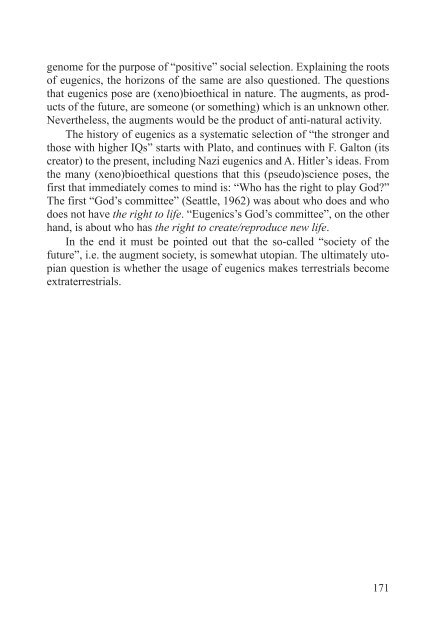10. Lošinjski dani bioetike - Hrvatsko filozofsko društvo
10. Lošinjski dani bioetike - Hrvatsko filozofsko društvo
10. Lošinjski dani bioetike - Hrvatsko filozofsko društvo
You also want an ePaper? Increase the reach of your titles
YUMPU automatically turns print PDFs into web optimized ePapers that Google loves.
genome for the purpose of “positive” social selection. Explaining the roots<br />
of eugenics, the horizons of the same are also questioned. The questions<br />
that eugenics pose are (xeno)bioethical in nature. The augments, as products<br />
of the future, are someone (or something) which is an unknown other.<br />
Nevertheless, the augments would be the product of anti-natural activity.<br />
The history of eugenics as a systematic selection of “the stronger and<br />
those with higher IQs” starts with Plato, and continues with F. Galton (its<br />
creator) to the present, including Nazi eugenics and A. Hitler’s ideas. From<br />
the many (xeno)bioethical questions that this (pseudo)science poses, the<br />
first that immediately comes to mind is: “Who has the right to play God?”<br />
The first “God’s committee” (Seattle, 1962) was about who does and who<br />
does not have the right to life. “Eugenics’s God’s committee”, on the other<br />
hand, is about who has the right to create/reproduce new life.<br />
In the end it must be pointed out that the so-called “society of the<br />
future”, i.e. the augment society, is somewhat utopian. The ultimately utopian<br />
question is whether the usage of eugenics makes terrestrials become<br />
extraterrestrials.<br />
171
















